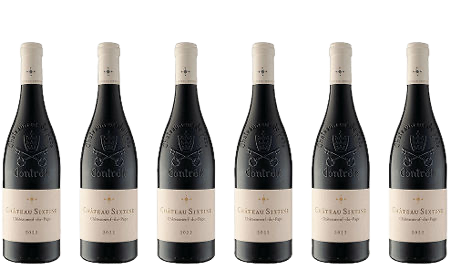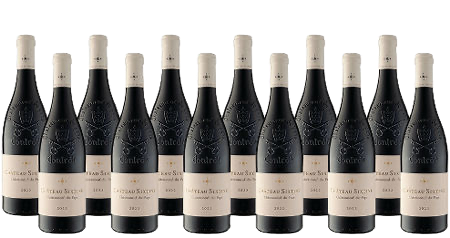Filter by
- $19.99 per bottle12 bottles - $239.88$215.88 Unlimited Member Price
- $22.99 per bottle12 bottles - $275.88$248.28 Unlimited Member Price
- $69.99 per bottle12 bottles - $839.88$755.88 Unlimited Member Price
- $39.99 per bottle12 bottles - $479.88$431.88 Unlimited Member Price
- $18.99 per bottle12 bottles - $227.88$205.08 Unlimited Member Price
- $54.99 per bottle12 bottles - $659.88$593.88 Unlimited Member Price
- 6 bottles - $419.94
- Château Sixtine Vineyard Partnership (12 bottles)12 bottles - $839.88
- $34.99 per bottle12 bottles - $419.88$377.88 Unlimited Member Price
- $99.99 per bottle12 bottles - $1199.88$1079.88 Unlimited Member Price
- $28.99 per bottle12 bottles - $347.88$313.08 Unlimited Member Price
- $42.99 per bottle12 bottles - $515.88$464.28 Unlimited Member Price
- $19.99 per bottle12 bottles - $239.88
- $36.99 per bottle12 bottles - $443.88$399.48 Unlimited Member Price
- $69.99 per bottle12 bottles - $839.88$755.88 Unlimited Member Price
- $69.99 per bottle12 bottles - $839.88$755.88 Unlimited Member Price
- $49.99 per bottle12 bottles - $599.88$539.88 Unlimited Member Price
- $44.99 per bottle12 bottles - $539.88$485.88 Unlimited Member Price
- Showing (1 to 18 of 18)
1
Page 1 of 1
Wine FAQs
What Is Rhône Wine?
Rhône wine is produced in the Rhône region of France and follows the rules set by a labeling system—the appellation d’origine contrôlée. Appellation d’origine contrôlée (or A.O.C.) is a designation used to identify agricultural products, like wine, that undergo production and processing in a specific geographical area and in a recognized way.
Home to some of the best southern French wines, the Rhône is France’s third largest wine region, behind the Languedoc-Rousillon region and Bordeaux.
Where Is the Rhône Wine Region?
The Rhône wine region is nestled inland in the Rhône Valley, Southern France, and is bisected by the Rhône River. It extends from Lyon in the north to the Camargue area on the Mediterranean coast in the south.
It’s separated into two hilly subregions—the Northern Rhône and Southern Rhône—and several A.O.C.s. The climate in the Northern Rhône consists of hot summers and harsh winters and enjoys a cool wind all year round. The Southern Rhône has a more Mediterranean climate with less dramatic seasons, making it perfect for growing a diverse range of wines.
Vines have been cultivated in the Rhône region since the 4th century B.C. However, winemaking in the area was considerably expanded under the Romans, who established a flourishing wine trade.
What Are the Wine Regions in the Rhône?
The notable wine regions of the Rhône include:
- Northern Rhône: Home to some of the world’s best Syrah wines, this area is characterized by steep sloping hills that lead down to the Rhône River. Across the eight A.O.C.s in this subregion, Syrah is the only red grape variety permitted, and the only white varieties allowed are Roussanne, Marsanne and Viognier.
- Southern Rhône: This area is best known for its blended wines, with Grenache often playing the lead role, supported by Syrah and Mourvèdre. With its differing soil and environments, the Southern Rhône has several microclimates across its 14 A.O.C.s. This subregion is responsible for producing one of the world’s most famous red wines, Châteauneuf-du-Pape.
- Côtes du Rhône A.O.C.: Covering both the north and south subregions of the Rhône, this A.O.C. is typically used if a wine doesn’t qualify for an appellation with stricter standards. Therefore, most Côtes du Rhône A.O.C. wines are from the Southern Rhône, as the north has more famous appellations and a smaller total vineyard surface.
- Hermitage A.O.C.: Based in the Northern Rhône, the Hermitage A.O.C. is south of Lyon and is best known for its Syrah production—some even consider it the Syrah variety’s spiritual home. Although best known for its earthy red wines, rich and dry white wines made from Marsanne and Roussanne grapes are also popular.
- Côte-Rôtie A.O.C.: Famous for its uniquely steep slopes leading down to the Rhône River and its sun-baked vineyards, Côte-Rôtie is an A.O.C. found in the Northern Rhône. The wines from this area are red—a mix of Syrah and 20% Viognierand follow strict production processes to meet appellation rules. This unusual combination creates unique, delicious, fruity and floral wines.
- Châteauneuf-du-Pape A.O.C.: Located around the village of Châteauneuf-du-Pape in the Southern Rhône, this area is home to some of the world’s most famous red wine blends. Under appellation rules, a total of 13 grape varieties are permitted to grow in this area, including Cinsault, Grenache Noir and Grenache Blanc.
What Are Famous Rhône Wines?
The region’s differing climates and soil types allow a diverse range of wine grapes to grow in the Rhône. Both red and white wine grapes thrive, with the most popular wine grape varieties including Syrah, Grenache and Mourvèdre for reds and Marsanne, Roussanne, Grenache Blanc and Viognier for whites.
Some of the most famous wines from this region include:
- Châteauneuf-du-Pape: Perhaps the most famous wine from the Rhône region, Châteauneuf-du-Pape is known for its robust, full-bodied red wines, which are commonly described as earthy and spicy. There are also white Châteauneuf-du-Pape wines, which can range from lean and mineral-driven to rich and opulent, with flavors of peach and honeysuckle.
- Côte-Rôtie: Originating from the northern subregion, this fresh and dry red wine’s name translates to “roasted slope,” a reference to the steep hills where its Syrah grapes are grown. It’s one of the most expensive and sought-after French wines, with black raspberry, violet, olive and chocolate flavors. Côte-Rôtie is unique, as it’s allowed to be blended with a maximum of 20% Viognier, a white wine grape.
- Hermitage: From arguably the most famous appellation in the Northern Rhône, Hermitage wine is available in both red and white styles and produced in small batches. Red Hermitage wines are made exclusively from Syrah grapes and are rich and robust with black frui and leather flavors. White Hermitage (or Hermitage Blanc) wines are made from Marsanne and Roussanne grapes, creating an age-worthy wine with flavors of stone fruits, hazelnut and oak.





















